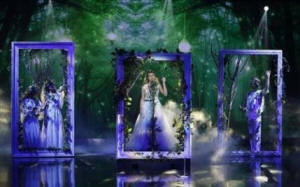 |
|
 American
without Arab roots almost wins 'Arabs Got Talent'
American
without Arab roots almost wins 'Arabs Got Talent'
[December 09, 2013] BEIRUT (Reuters) — An American singer with no Arab heritage nearly took the top prize in the "Arabs Got Talent" television show this weekend, breaking into the top three alongside a Palestinian artist and a Syrian dance troupe.
|
Jennifer Grout, a 23-year-old from Massachusetts, fell just
short in the end, but her renditions of classical Arabic songs
had stunned some audiences — especially given that she only
speaks a little Arabic. Late on Saturday night, Grout vied with an eclectic set of
contestants for the show's third season finale, including a
Moroccan juggler, Kuwaiti comedians, an Egyptian "popper," a
Lebanese drummer, and an acrobatics squad dressed as Pharaohs. Dressed in a flowing white gown, Grout sang "Wahashtini" (I've
Missed You), a classic by Lebanese-Egyptian singer Souad
Mohamed. The judges praised her voice and her enthusiasm for classic
Arabic music — much of it relatively unknown outside the Middle
East — at a time when many commentators lament that Western
cultural hegemony has eroded the region's distinct identity. Grout lives in Morocco and organizers said it was not necessary
to be an Arab to compete. "I believe Jennifer is a phenomenon we should celebrate," Saudi
Arabian comedian Nasser al-Qasaibi said. Egyptian actor Ahmed Helmy played on the idiosyncrasies of his
country's dialect — the Arabic alphabet's "J" is pronounced as a
"G" in Egyptian — to commend Grout's talents. "From today, you're no longer 'Jennifer,' you're 'Gennifer'," he
said. Umm Kalthoum, Grout's favorite Arabic singer, was also Egyptian,
and has a near-mythic status in the Arab world. Grout was joined in the top three by Mohamed al-Deiri, a
Palestinian artist who drew enthusiastic applause by swiftly
burning a portrait of Yasser Arafat onto a large white canvas
with two gas torches, and Syrian dance team Sima. In the end it was Sima's performance — an interpretative dance
that incorporated themes of power and conflict — that took the
top prize. The number opened with a group of dancers dressed in black and
white fighting over a throne, an image that could be seen as
symbolic of Syria's conflict, which has killed more than 100,000
people. "In the finals, we wanted to do something related to the reality
we're living, to present it as it is, how brutal it is and how
violent," said Lana Fehmi, one of Sima's dancers. "I think it reflects reality but, at the same time, I think sometimes it can give hope."
(Reporting by Alexander Dziadosz;
editing by Angus MacSwan) [© 2013 Thomson Reuters. All rights reserved.] Copyright 2013 Reuters. All rights reserved. This material may not be published,
broadcast, rewritten or redistributed.
|
 |

